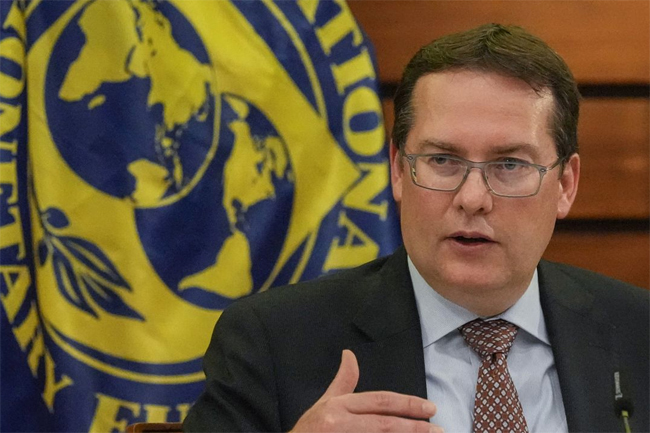Swift completion of final agreements with official creditors critical for Sri Lanka – IMF
January 19, 2024 03:35 pm
The International Monetary Fund (IMF) says it is critical for Sri Lanka to swiftly complete the final agreements with the official creditors and reach a resolution with the external private creditors.
IMF mission team, led by Senior Mission Chief Peter Breuer, was in Sri Lanka from January 11-19 to discuss recent macroeconomic developments and progress in implementing economic and financial policies under the EFF arrangement.
Issuing a statement to convey its preliminary findings observed during the visit, the delegation says the economic reform program implemented by the Sri Lankan authorities is now yielding the first signs of recovery with positive real GDP growth in the third quarter of 2023, low inflation, increased revenue collection, and a build-up of external reserves.
Commending the commendable progress made by putting debt on a path towards sustainability, the IMF mission team highlighted that execution of the domestic debt restructuring was an important milestone.
However, swift completion of final agreements with official creditors and reaching a resolution with external private creditors remain critical, the statement underscored.
According to the delegation, progress in meeting key commitments under the IMF-supported program is set to be formally assessed in the context of the second review of the EFF arrangement alongside the forthcoming 2024 Article IV consultation assessing Sri Lanka’s economic health.
Attached below is the full statement issued by the IMF mission team:
“The economic reform program implemented by the Sri Lankan authorities is yielding the first signs of recovery. Real GDP recorded positive growth of 1.6 percent year-on-year in the third quarter of 2023, the first expansion in six consecutive quarters. Shortages of essentials have eased, and inflation remains contained. Gross international reserves increased by USD 2.5 billion during 2023, and preliminary data point to improved fiscal revenue collections during the fourth quarter of 2023. However, challenges remain as these improvements need to translate into improved living conditions for Sri Lanka’s people.
“In this context, sustaining the reform momentum and ensuring timely implementation of all program commitments are critical to rebuilding confidence and putting the recovery on a firm footing that will benefit all people. Swift progress towards the introduction of a progressive property tax is key to ensuring fair burden sharing while sustaining the revenue-based consolidation. Tax policy measures need to be accompanied by strengthening tax administration, removing tax exemptions, and actively eliminating tax evasion to make the reforms more sustainable and to further build confidence among creditors to support Sri Lanka’s efforts to regain debt sustainability.
“Building on the Central Bank of Sri Lanka’s success in taming inflation, future monetary policy decisions should remain prudent with a focus on keeping inflation expectations well anchored. Against continued uncertainty, it remains important to continue rebuilding external buffers through strong reserve accumulation. Protecting the poor and the vulnerable through improved targeting and better coverage of cash transfers remains critical.
“To safeguard the stability of the financial sector and bolster its capacity to support economic growth, the authorities need to urgently finalize amendments to the Banking Act in line with their commitment under the IMF-supported program, implement the bank recapitalization plan and strengthen the financial supervision and crisis management framework.
“Following the publication of the IMF Governance Diagnostic report, it is now imperative for the authorities to adopt their own action plan for implementing the recommendations in the report beyond the priority commitments under the EFF arrangement. At the same time, ensuring an enabling environment for governance and transparency reforms to take place is key to bolstering public confidence and facilitating implementation of these important efforts.
“The authorities have made commendable progress with putting debt on a path towards sustainability. The execution of the domestic debt restructuring was an important milestone. A swift completion of final agreements with official creditors and reaching a resolution with external private creditors remain critical. Progress in meeting key commitments under the IMF-supported program will be formally assessed in the context of the second review of the EFF arrangement alongside the forthcoming 2024 Article IV consultation assessing Sri Lanka’s economic health.
“The IMF team held meetings with President and Finance Minister Ranil Wickremesinghe, Central Bank of Sri Lanka (CBSL) Governor Dr. P. Nandalal Weerasinghe, Speaker Mr. Mahinda Yapa Abeywardana, Minister Mr. Kanchana Wijesekera, Minister Mr. Wijeyadasa Rajapakshe,State Minister Mr. Shehan Semasinghe, Secretary to the Treasury Mr. K M Mahinda Siriwardana, Governor of Northern Province Mrs. P.S.M.Charles, Governor of Eastern Province Senthil Thondaman, and other senior government and CBSL officials. The IMF team also met with Parliamentarians, representatives from the private sector, civil society organizations, and development partners.
“We would like to thank the authorities for the excellent collaboration during the mission, including during the mission’s visit to the Northern and Eastern provinces. This visit enriched the mission team’s understanding of the challenges as well as the potential of Sri Lanka. We reaffirm our commitment to support Sri Lanka for a full economic recovery from the crisis.”












